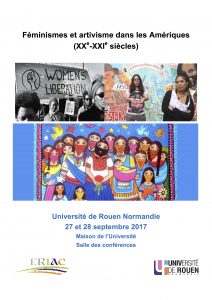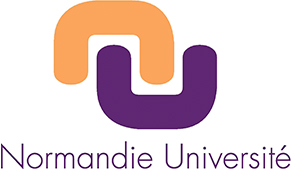Call for papers « Feminisms and ARTivism in the Americas (20th-21st centuries) »
University of Rouen Normandie – 27/28 September 2017
 Women’s movements have a long, diverse history. Yet, the diversity and plurality of these female voices and modes of action have been often occulted. Like in other areas of thought and action, western-centric theories and manifestations have been the most visible. These narratives quickly became universal. Many recognized theorists as well as the periodization of feminism into “waves” relate only to white, upper- and middle-class women. However, other forms of expression and action have also developed early on. North American Black feminism dates back to the 19th century and was part of the abolitionist movement[1]. In Ibero-America[2], the political organization of black women started later but recent research has underlined the agency of enslaved women, notably through disobedience[3]. Indigenous women’s political participation is important in their communities since the colonial era, as evidenced by the crucial actions of Gregoria Apaza, Bartolina Sisa and Micaela Bastidas during Túpac Amaru II’s revolution (1780-1782)[4].
Women’s movements have a long, diverse history. Yet, the diversity and plurality of these female voices and modes of action have been often occulted. Like in other areas of thought and action, western-centric theories and manifestations have been the most visible. These narratives quickly became universal. Many recognized theorists as well as the periodization of feminism into “waves” relate only to white, upper- and middle-class women. However, other forms of expression and action have also developed early on. North American Black feminism dates back to the 19th century and was part of the abolitionist movement[1]. In Ibero-America[2], the political organization of black women started later but recent research has underlined the agency of enslaved women, notably through disobedience[3]. Indigenous women’s political participation is important in their communities since the colonial era, as evidenced by the crucial actions of Gregoria Apaza, Bartolina Sisa and Micaela Bastidas during Túpac Amaru II’s revolution (1780-1782)[4].
Any investigation of organization by women of color should take into account the sociohistorical contexts that influence their development. Systems of colonial exploitation (plantocracy, slavery, latifundia) have conditioned forms of political action in the Americas. Bodies of Black and indigenous women were particularly subjected to control and repression. These circumstances limited possibilities for reunion and political engagement for a long time. Surviving oppression has been a full time job for many women. For all that, they never stopped to fight for justice. These struggles have been rather autonomous, numerous and varied over time and/or space. They have not yet resulted in the creation of global movements.
These particular histories also explain the apparent “delay” in the integration of these actions in Herstory. This is why this conference wants to re-evaluate the role and importance of these movements.
Given the dispersed and multifaceted nature of their forms of action, the theoretical importance of American women of color has been invisible, despite being rich and vigorous. For example, Black feminist thought in the United States has revolutionized theory by introducing new questions about the subject of feminism (“we, women”) and proposing new concepts to analyze forms of domination, like intersectionality (coined by law professor and leading critical theorist Kimberlé Crenshaw). Inspired by the concepts, histories and experiences unique to Black women, Ibero-American feminists have developed an equally rich critical thought called decolonial feminism[5]. Feminists like Ochy Curiel, Lélia Gonzalez or Yuderkys Espinosa propose an antiracist feminist thinking rooted in indigenous and African-American history. Through their experience, these feminists also question gender relations and conceptualize the notion of political lesbianism[6].
The specificity of counterhegemonic feminisms is due to a unique articulation between theory and praxis. For instance, feminist ARTivists are increasingly expressing their demands across the continent, notably through hip hop or visual arts – like the collectives “Somos guerreras” or “Batallones femeninos”. These forms of action and activism are part of a global struggle that does more than questioning patriarchy only, that does more than many white and bourgeois feminist collectives. These feminists urge « to fight the whole world » as Michele Wallace wrote in 1975[7]. For Abya Yala feminists like Ochy Curiel or Yuderkys Espinosa, it is necessary to fight against patriarchy, racism and the coloniality of power, all at the same time and by drawing on the specific history of indigenous and Black people. The body plays a fundamental role in both the issues raised and privileged forms of action. As a site of colonization, the body has to be reinvested and re-appropriated through arts and performance.
This conference will examine the plurality and the strengths of these movements across America. We invite papers that deal with the specific features of these feminisms and their contribution to the fight against race, gender, sexuality and class oppression. Comparative works are particularly encouraged.
We welcome proposals for individual papers on the following themes:
Theme 1 – Afro-feminisms
North American Black feminists first questioned hegemonic feminism by drawing from their own experiences. They integrated categories of race and sex to enrich Marxist critical theory and Materialist Feminism. Black Women’s movements in Ibero-America are more recent. They articulate their filiation with Africa to common claims they share with other movements of Latin-American Women, especially indigenous. In Brazil, Lélia Gonzalez forged the term “amefrica ladina” to highlight these links. In the Hispanic world, other strong movements emerged in Cuba and Peru.
Theme 2 – Feminisms on the Borders
Given the plurality of American women’s movements, it is important to mention how experience, knowledge and practice have circulated all over America. These interactions will be analyzed more through their actions than through theories. For example, Chicana feminists stand at the intersection of different cultures, references and practices and have redefined themselves as mestiza or “from the border”.
Theme 3 – Decolonial Feminism
This movement emerged at the beginning of the 21st century but is rooted in the work of decolonial masculine thinkers. It deepened it by integrating gender and sexuality issues. Using a non-eurocentric standpoint, decolonial feminism calls attention to the thought produced “from the margins by feminists, women, lesbians and people of color” (Y. Espinosa).
Theme 4 – Indigenous activism
Women in indigenous communities never confined themselves to private spaces. However, since the conquest, they have been subjugated to the colonial patriarchal system. In the last third of the 20th century, they have mobilized indigenous groups politically in Chiapas, Guatemala, Ecuador and Bolivia. These movements claim to be the “original people” with specific rights in order to lift themselves out of their status of second-class citizens. But it is also a fight against capitalist and neoliberal expansion in their territories as shown by the examples of Berta Cáceres (lenca), Máxima Acuña (quechua) ou LaDonna Brave Bull Allard (sioux).
Theme 5 – Bodies, arts and action
Activists in the Americas wear many different hats. Art is an organizing strategy to fight oppression. Literature and music have become places of contestation. North American writers like Audre Lorde, Gloria Anzaldúa or Cherríe Moraga are iconic examples. Music is another space for expression and action: Ochy Curiel is a singer-songwriter in addition to being feminist theorist and activist. Others devote themselves to artistic performances, urban arts and/or mobilize audiovisual material to defend the rights of indigenous, Mesoamerican and Andean communities.
Theme 6 – Feminisms and direct action
In the Americas, many women who were associated with indigenous and afro-feminist activism have also fought capitalism in armed revolutionary movements: The Black Panther Party in the United States, the Zapatista movement in Mexico, the Revolutionary Armed Forces of Colombia, the Shining Path (SL), the Túpac Amaru Revolutionary Movement in Peru, or from the Sandinista National Liberation Front (FSLN) in Nicaragua.
Selected bibliography
- Anzaldúa Gloria, Borderlands. La Frontera. The New Mestiza, San Francisco: Spinsters, Aunt Lute, 1987.
- Bacchetta Paola, Falquet Jules, Théories féministes et queers décoloniales : interventions chicanas et latinas états-uniennes, Les Cahiers du CEDREF, Paris, 2011.
- Bairros Luiza, « Nossos Feminismos Revisitados », Revista de Estudos Feministas, año 3, segundo semestre, 1995, p. 458-463.
- Cacheux Pulido Elena Margarita, « Feminismo chicano: raíces, pensamiento político e identidad de las mujeres », Reencuentro, n° 37, agosto 2003, p. 43-53.
- Curiel Ochy, « La crítica postcolonial desde el feminismo antiracista », Nómadas, n° 26, avril 2007, p. 92-101.
- Curiel Ochy, Falquet Jules, Masson Sabine, dossier « Féminismes dissidents en Amérique latine et aux Caraïbes », Nouvelles Questions Féministes, 2005/2 (Vol.24).
- Davis Angela, Blues Legacies and Black Feminism: Gertrude Ma Rainey, Bessie Smith, and Billie Holiday, Vintage, 1999.
- Espinosa-Miñoso Yuderkys, « Una crítica descolonial a la epistemología feminista crítica », El Cotidiano n° 184, marzo-abril 2014, p. 7-12.
- Falquet Jules, « La propuesta decolonial desde Abya Yala: siguiendo las raíces feministas y lésbicas autónomas », dans De la Fuente Juan Ramón, Pérez Herrero Pedro, El reconocimiento de las diferencias. Estado, Nación, identidades y representación en la globalización, Madrid, Marcial Pons, 2016.
- Gargallo Celentani Francesca, Feminismos desde Abya Yala. Ideas y proposiciones de las mujeres de 607 pueblos en Nuestra América, México, Ed. Corte y Confección, 2014.
- Gonzalez Lélia, « Por um feminismo afrolatinoamericano », Revista Isis Internacional, Santiago, 1988, v. 9, p. 133-141.
- Guy-Sheftall Beverly, Words of Fire: An Anthology of African-American Thought, New York, The New Press, 1995.
- hooks bell, Feminism is for everybody: passionate politics, London: Pluto press, 2000.
- Lima Costa Claudia de, « Feminismo, tradução cultural e a descolonização do saber », Fragmentos, número 39, jul – dez 2010, Florianópolis, p. 45-59.
- Lugones María, « Hacia un feminismo descolonial », La manzana de la discordia, jul.-déc., vol. 6, n° 2, 2011, p. 105-119.
- Moraga Cherríe, Anzaldúa Gloria, This bridge called my back: writings by radical women of color, New York : Kitchen table, 1983.
- Wallace Michele, Combahee River Collective, Lorde Audre… [et al.], Black feminism : anthologie du féminisme africain-américain, 1975-2000, Paris : l’Harmattan, 2008.
Submission
Proposals for presentations in English, Spanish, Portuguese or French are welcomed and shall be submitted before 15 mars 2017 at the latest by e-mail to colloque.femart@gmail.com. They must include:
- Name and title of the author and contact information
- Title of the proposed presentation
- Brief Abstract (300 words)
- Brief Biographical Statement
- Selective bibliography
Notification of paper acceptance: 15 March 2017
An independent reading committee will select papers from the conference for publication in a special journal issue or an edited book volume.
Organizing Committee
- Christelle Gomis (European University Institute)
- Sandra Gondouin (Université Rouen Normandie)
- Anouk Guiné (Université Le Havre Normandie)
- Romain Magras (Université Rouen Normandie)
- Emanuele de Maupeou (Université Rouen Normandie)
- Lissell Quiroz (Université Rouen Normandie)
International Scientific Committee
- Paola Bacchetta (UC Berkeley)
- Sandeep Bakshi (Université Le Havre Normandie)
- Jules Falquet (Université Paris Diderot)
- Ramón Grosfoguel (UC Berkeley)
- Marie-José Hanaï (Université Rouen Normandie)
- Nathalie Ludec (Université de Rennes 2)
- Caroline Lepage (Université Paris Ouest Nanterre)
- Françoise Martinez (Université de La Rochelle)
- María Emma Mannarelli (Universidad Mayor de San Marcos, Lima)
NOTES
[1] Elsa Dorlin, « Introduction », dans Wallace Michele, Combahee River Collective, Lorde Audre… [et al.], Black feminism : anthologie du féminisme africain-américain, 1975-2000, Paris : l’Harmattan, 2008, p. 15. On this subject, see also, Gerda Lerner, The Grimke Sisters from South Carolina: Rebels Against Slavery, Boston: Houghton Mifflin Co., 1967.
[2] Different indigenous communities and organizations refuse to use the term “America” and prefer instead the term “Abya Yala” to designate the American continent. This expression has been taken up by decolonial thinkers.
[3] Carlos Aguirre, Agentes de su propia libertad. Los esclavos de Lima y la desintegración de la esclavitud. 1821-1854, Lima, 1993, Fondo editorial de Pontificia Universidad Católica del Perú; María Eugenia Chaves, «La mujer esclava y sus estrategias de libertad en el mundo hispano colonial a fines del siglo XVIII, Anales, n° 1, Göteborg University, 1998, p. 91-117; Aline Helg, Plus jamais, esclaves. De l’insoumission à la révolte, le grand récit d’une émancipation (1492-1838), Paris, Ed. La Découverte, 2016.
[4] Aymaras Gregoria Apaza (1751-1782), Bartolina Sisa (1753-1782) and Afro-Indian Micaela Bastidas (1744-1781) had leadership roles in the struggle for independence and died as martyrs.
[5] Jules Falquet, «La propuesta decolonial desde Abya Yala: siguiendo las raíces feministas y lésbicas autónomas», in De la Fuente Juan Ramón, Pérez Herrero Pedro, El reconocimiento de las diferencias. Estado, Nación, identidades y representación en la globalización, Madrid, Marcial Pons, 2016.
[6] Paola Bacchetta, Jules Falquet, Théories féministes et queers décoloniales : interventions chicanas et latinas états-uniennes, Les Cahiers du CEDREF, Paris, 2011.
[7] Black feminism …, op. cit., p. 57.





